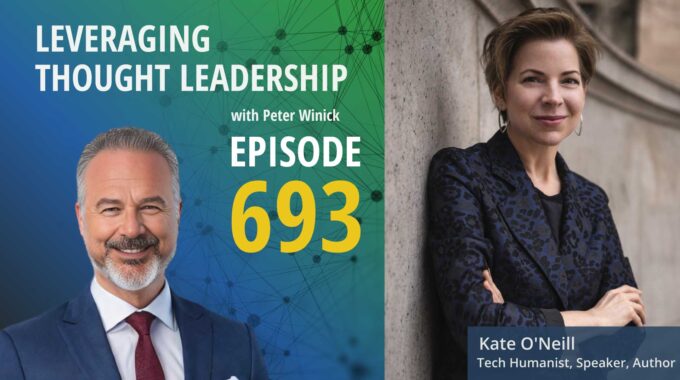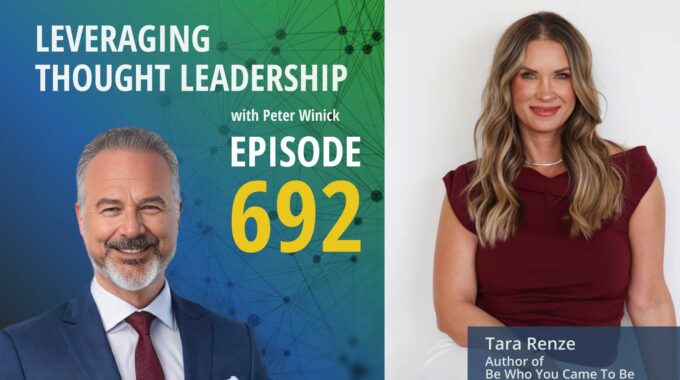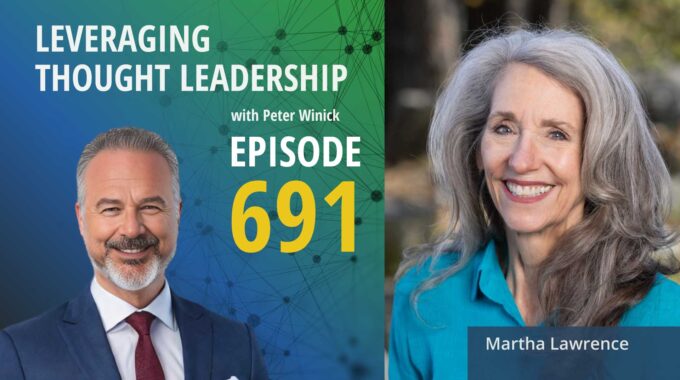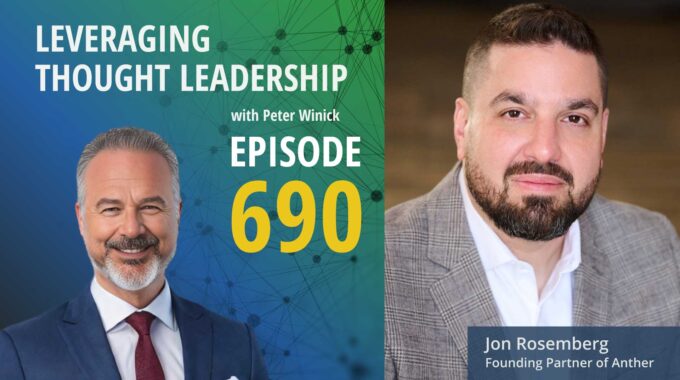Why speed without trust creates risk—and how executives fix it This episode focuses on how…
Behavioral Science and the Art of Thought Leadership | Jon Levy
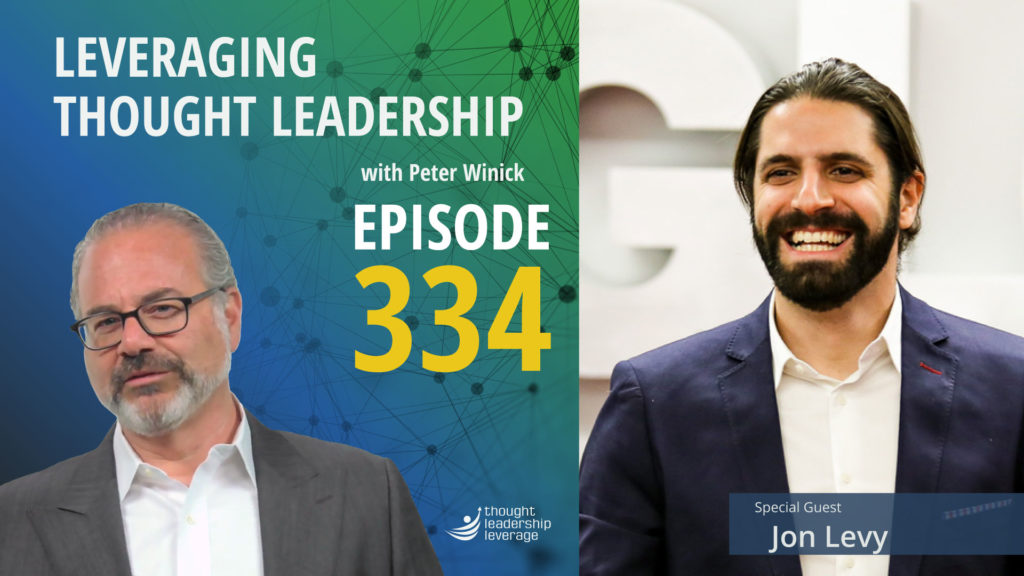
Focusing your thought leadership through the lens of understanding human behavior.
An interview with Jon Levy about his research as a behavioral scientist, and how he is helping companies change the way they approach culture, sales, and consumer engagement.
Today, we sit down with the incredibly insightful Jon Levy! Jon is a behavioral scientist and social engineer best known for his work on human connection and decision making. Jon is the founder of the Influencers Dinner, a secret dining experience started in New York in 2009. Twelve thought leaders, tastemakers, and influencers from various industries attend, but do not discuss their professional career, or share their last name – in order to guess, at the end of the dinner, what the other attendees do professionally. What started as an experiment has turned into a world class experience that brings guests from a broad spectrum of fields together to share insights, camaraderie, and a great meal. In addition to being a TED speaker, Jon also has a new book: You’re Invited: The Art and Science of Cultivating Influence.
We start today’s conversation with a discussion about the way humans, as a whole, possess a desire to experience something different and unique. Jon explains a bit about the SN/VTA part of the brain, which governs reward cognition, associative learning, and positively-valenced emotions. The SN/VTA engages during unusual experiences, and that response can be used to inspire curiosity and get an audience to authentically engage with your ideas. Behavioral science for the win!
The traditional methods for networking have become stagnant and overblown. People “turn off” when they’re bored, so how can we create a stronger connection? Jon shares tips about bringing people together for a mutual, unique experience, and how that can create relationships that are stronger than plain ol’ humdrum networking.
John talks about the enigmas of connection, and helps thought leaders understand why people do the things we do. This is a great lesson on how to tap into those responses by using a little bit of social engineering! Don’t miss it!
Three Key Takeaways
- Thought Leaders can create more interest in their products and ideas by adding a little uniqueness and novelty; raising people’s curiosity makes them engage more fully.
- When designing Thought Leadership courses, think about the frequency of communication, not just the depth of ideas.
- Trust is a must-have in Thought Leadership, but to gain trust you must be willing to show a level of vulnerability.
If you need a strategy to bring your thought leadership to market, Thought Leadership Leverage can assist you! Contact us for more information. In addition, we can help you implement marketing, research, and sales. Let us help you so you can devote yourself to what you do best.
Transcript
Peter Winick And welcome, welcome, welcome, this is Peter Winick, I’m the founder and CEO at Thought Leadership Leverage, and you’re joining us on the podcast today, which is Leveraging Thought Leadership today. My guest is John Levy. John is a behavioral scientist best known for his work in influence, human connection and decision making. He specializes in applying the latest research to transform the ways companies approach marketing, sales, consumer engagement and culture. More than a decade ago, and this is probably one of his most known where John founded the Influence Dinner, which is a secret dining experience for industry leaders ranging from Nobel laureates, Olympians, celebrities and executives, artists, musicians and even the Grammy winning voice of the Bach, who let the dogs out guest cooks dinner together but can’t discuss their career or give their name. And then once they’re seated, they reveal who they are. His new book is just out. It’s called You’re Invited, the art and science of Cultivating Influence, and then obviously, in his free time, he works on outrageous projects, among them spending a year traveling all seven continents to the world’s greatest events. Remember when we travel Grand Prix, Art Basel Burning Man now, I guess you could spend a year going to all seven areas in your apartment. Anyway, welcome. This is exciting.
John Levy This is super fun. Yeah, it’s been a while since I’ve gotten to travel, but at least I’ve had the time to write a book. I’m really proud of.
Peter Winick Yeah, very cool. So behavioral scientist, which is different. How is it different from a behavioral economist? Because I’m like a behavioral economist nerd.
John Levy Oh yeah. So it’s. Most of the decision making that behavioral economists look at are generally around like transactional thinking, right? So how you value something now versus the future? Whereas I’m also curious about things that have nothing to do with, with economic decisions like we did the largest. I think it was the largest study in history on dating. We looked at four hundred and twenty one million potential matches between people and found weird things like if you have the same initials, you’re eleven point three percent more likely to date. It’s called and
Peter Winick nobody would consciously say I showed you as my badge and not because you have beautiful eyes or, you know, whatever, but it’s because we both have the same initials that probably
John Levy nobody would even think about it. Most of the decisions that we make, we probably don’t really know the reason that we make them. There’s a lot going on in the background. And the more I studied, the more I laugh about how ridiculous I am.
Peter Winick Oh, that’s fantastic. So, so let me ask you, sort of how does one go to be a behavioral economist that running the influencer, writing books and working with companies like Microsoft, Google, Samsung, etc. Obviously, this must be a logical, linear obvious.
John Levy Of course, everything’s always logical and linear. So when I was 28, I was probably like the stereotypical not living up to your potential didn’t know anybody, all that kind of stuff. And I came across this kind of wild research study about the obesity epidemic, and the question was some epidemics are like coronavirus. They spread from person to person. Sure. Some are just like a percentage of the population. To the best of our knowledge, you don’t get Alzheimer’s because you hang out with somebody who has Alzheimer’s. That’s not how it spreads, right? And so the researchers were curious what kind of it? And what they found was shocking. They found that if you have a friend who’s obese, your chances of obesity increased by 45 percent. But what’s more interesting, your friends who don’t know them have a 20 percent increased chance.
Peter Winick And this is like third hand smoke of a Big Mac or something.
John Levy Yeah, exactly. And then they’re like one additional degree away. It’s a five percent increase. So but it’s true for like happiness, marriage and divorce rate. Smoking habits, voting habits. Just about anything we care about. So I said, OK, I’m going to figure out what actually connects people. I’m going to figure out how to build trust quickly. Because if I want to meet people who could have the biggest impact on my life, they’re going to be busy as anything else. I’m going to have much time with them. So how do we really build trust quickly? And the third thing I realized was. The real power isn’t just knowing somebody’s networking is not like a very appealing activity, it kind of sucks. And so I wanted to create an opportunity to build a community so that people have a sense of belonging and want to engage with each other, not just for me.
Peter Winick Mm hmm. So was this the same study? And I’m trying to remember the book as I read it, where it’s also the five friends, the five people you spend the most time with have the most influence on your life.
John Levy So that’s more of like a kind of meme actual than it’s never been able to find the research to suggest that there’s a lot of things that have made it into pop culture that some are accurate. And the five might be the right number. It might not. And then there’s some that are just slightly wrong, like it takes three weeks to form a habit. There’s no evidence of that. Yeah, yeah.
Peter Winick So but you saw this this study and then went the other way and said, Well, if that is so, what would be the best and coolest and smartest and most interesting people to hang out with? And obviously, they’re not sitting around eating Cheetos and watching Netflix all day. They probably….
John Levy Yeah, they’re insanely over committed already.
Peter Winick And I think the secret to your dinners is interesting. Smart, super busy people will make time to hang out with interesting smart, super busy people, assuming it’s in an unpretentious, sort of trusting, forgiving environment, if that’s a word.
John Levy So super busy, super successful people will probably just go about anywhere that other super busy, super successful people are, regardless of how pretentious it is. But it’s even better if it’s not right. So look at Davos, for example, Davos, it costs like $250000 to go. Right. It’s got this air of status around it, and people will go there because it’s really hard to gather those people, and if somebody can cure it, well, we’ll go out of our way for it. Now, if you can create something intimate that has no pretentiousness, then that’s even more appealing, right? In fact, I’d argue that there’s two or three other things you really want to consider. One is that this curation thing that you pointed to. But the other is novelty. So the most influential people in our culture, they’ve experienced it all. They don’t want to attend another casino themed fundraiser or grab coffee with some random person that emails them. Some of these people could afford to buy like their own coffee houses if they wanted, like they don’t
Peter Winick know if they wanted to go somewhere cool, they would just go somewhere cool, right? They have the means to go to a Ritz-Carlton wherever they, you know, the the environment isn’t enough of a draw. Precisely. Yeah.
John Levy So what we want to do is actually find something novel, something that stands out and there’s a section of the brain called the S&P. It’s known as the major novelty center of the brain. And when it’s triggered, it responds relative to how novel something is and actually entices us to explore and understand. So if we have something that stands out as different in a positive way. People will actually be curious about it and will want to engage. And so when I design the dinner, I knew I couldn’t just have a dinner. I knew I needed like a crazy design for there would need to be like rules or something special about it. So when people do things, it’s like, like over coffee, when you could, I don’t know, go for a hike, right? Why couldn’t we make that hike even more interesting by everybody bringing a problem they’re struggling with? And you have five people with you and suddenly you have a curated group of people doing something novel, right?
Peter Winick So those two variables are kind of cool. So I’m going to go back to my question, though, is how did you get here? What was the so you had this aha moment when you read the study and then your outcome, your response to that was, well, I’ll just create this cool experiment. And then obviously, the experiment took off and it became a thing. But then, yeah, how does that connect? Everything else in your world is a thought.
John Levy So what’s interesting is that once I really developed an expertise on how to connect and build trust with these people. Then opportunity started coming up, I hosted a really well-known neuroscientist, and he said, Hey, I want you to start doing research with me. And that’s where my research started coming from. So we did research on purchasing behavior and research on dating and now research on YouTube. And so that’s where the I went from doing applied science to actual research. But then the book deal, for example, came because I hosted somebody. Everything that I’m up to is a byproduct of the interesting people I’ve gotten to make me terribly…
Peter Winick Stay there for a second, because I think this is the antithesis of network old school networking, which if anybody tells you they enjoy that they’re either psychopathic or something.
John Levy Oh my god, it’s the worst.
Peter Winick Right? But the model was, you go to this thing, whatever that was the Chamber of Commerce, the breakfast. Yeah, the god awful thing. And the more business card you shoved down somebody else’s throat, magic was supposed to happen and you’d be, you know, a new clients and whatever. But it was always very take, take, take, take, take was never a mindset of, hey, even getting to know you as a human. That was novel and everybody was going with this intent of, you know, as are, you know, I’m a seller. Are you a buyer? I’m a seller. You buy it right? And then, you know, you went the other way and said, What have we just got everybody to sort of take off their masks and just have an experience together? This visceral connection of making a meal to share? And then the reveal is, holy cow. That person was, you know, whatever the, you know, world renowned, such and such. But you got to know them before the reveal unless you recognize them. And it sounds like in essence, your outcome is the opposite of networking because it’s unintentional, serendipitous, but far more powerful and interesting and fantastic.
John Levy So I would agree wholeheartedly. But there’s also two additional interesting factors add on one of them, which is like networking literally makes us feel dirty, but what doesn’t is making friends. Yep. And if you look at what actually causes us to make friends, it’s either like shared history or something like that. Like, we both went to the same fraternity or something. Right? Or there’s this thing called the IKEA effect. Right, right. And the IKEA effect states that we disproportionately care about are IKEA furniture because we had to assemble it. So essentially anything we put effort into, we care about disproportionately. So I wanted to find an activity so that people could put effort into it. And in this case, the activity was cooking together.
Peter Winick But it’s not like you’ve got Daniel Belay there where the got food terrible. It could be garbage, right?
John Levy It really like, listen, it’s edible, it’s fine. But I’ll be honest, like the recipes are Chipotle’s way better, right? Like, for $8, you could have gotten a better meal. And so we actually had a famous journalist and author come to one of our dinners, and she said I was expecting a phenomenal meal and decent company. I got the exact opposite.
Peter Winick But that’s kind of the point. If you’re enjoying this episode of Leveraging Thought Leadership, please make sure to subscribe. If you’d like to help spread the word about our podcast, please leave us a review and share it with your friends. We’re available on Apple Podcasts and on all major listening apps, as well as at ThoughtLeadership Leverage.com/podcasts. I want to touch on something that you said earlier this whole making friends concept because there’s a point in our life, right? We go to grade school and we go to university and you move into a new town, you get a new job. We’re sort of like, Oh, these are the times in your life or the events or the milestone you supposed to make friends. Then you wake up one day and you’re like, forty-five or whatever. But how do I make a friend? And it’s like, OK, that’s odd. You can do it through your kids if you’re doing similar events or sidelines of a soccer career. But those are sort of the byproducts of other things. But it’s kind of not easy to really make a friend as an adult.
John Levy Yet it’s also what’s even weirder is that more and more adults need friends. Yeah. So there’s this wild study. In 1985, the average American had just about three friends besides know. By 2004, it was down to two. Mm hmm. Now that’s 50 percent of our friends lost in one generation. Now the reason that’s crazy is that we always like to blame social media and like all these other, and I’m sure it’s aggravating the situation. But the big culprit is that we move.
Peter Winick The mobility, yeah. We’re more connected, yet have less friends, right, because when I move, you know, I go on to Facebook any day and say, Oh, there’s someone that I was mildly interesting 10 years ago, 35 years ago, and now I’m even less mildly interested in the fact that they, you know, whatever got a cockapoo or something. Yeah.
John Levy So the interesting thing is that two aspects of that, in many cases, platforms like Facebook and Instagram. These are our platforms that people end up less happy when they engage with it. Right, right. Versus like YouTube, unless you end up in like some weird flat Earth Society videos or whatever it is, you end up happier. It’s generally more entertaining or enlightening. Right? Hmm. The other is there’s this characteristic of human beings called the Alan Curve.
Peter Winick Yeah.
John Levy Which essentially states that the frequency of our communication increases the closer our desks are at work.
Peter Winick Yep
John Levy And it grows.
Peter Winick Asterisk, except in a pandemic. Or that could kill you, right?
John Levy Yeah. And then communication goes to zero. Yeah, right. The problem is that when we move because we’re not exposed to people constantly right there isn’t this mirror exposure effect. We’re reminded of people. Then it’s harder to maintain those social parts.
Peter Winick Right? You have to be more deliberate about it, right?
John Levy Much more deliberate. Yeah. Yeah. And so, the fact is that some people can be really good about it, right? Like people who call home to speak to their parents, things like that, setting up family zoom times and calls and all that. But that’s not the case for most of us. I’m assuming. It’s hard to build those happen. And so, what we really need to be accepting of is that unless we really develop relationships in our immediate area, it’s going to be hard to have friendship.
Peter Winick So. Give me a sense, then, because you know, there’s the research side of you, there’s the dinner piece, which isn’t really a business model.
John Levy It’s a terrible business model.
Peter Winick Right, right, right. Right. Well, I mean, to fun, it’s a fun thing. It’s a differentiator. Intimate, you know, at a minimum, it’s a brand builder. It’s also fun for sure. There’s some ultimate benefits, but it’s not like, you know, this is a Davos or Ted or you’re charging $10000 for dinner. What are the business models and also, to some degree, argue that authorship is not really a business model?
John Levy Oh, I would agree to. OK, so
Peter Winick let’s see, what can I hire you to do? What is the problem? By whom?
John Levy So it turns out that right now people are incredibly concerned with two aspects and from a business perspective. One is company culture. Now do we create a sense of belonging and community? Hmm. And the research is funny on this. It turns out you can track company stock value employees, sick days and profitability to oxytocin levels in employee bloodstream.
Peter Winick Interesting.
John Levy Meaning the closer your employees feel to each other, the harder they’re going to work.
Peter Winick If you have a boss is the best friend at work theory, right?
John Levy Yeah, precisely. That’s exactly it. So I’ve been hired by a whole slew of companies to help with company transformation, cultural transformation, reeducating or educating about educating people on new core values and things like that.
Peter Winick So stay there for a moment then. So everybody thought that, you know, Google is the coolest company, right? And they’re the coolest company. Because if you like micro brewing, they’ll pay for the microbrewery club or if you like archery and whatever. And it was like once you dug into that, it was like, Yeah, what does it cost them to host a microbrewery club like a couple of pizza pies every, every couple of weeks? But the reality is you get 10 people that are connected around something your passion. Passionate friendships form cross-functionally across organizations, and it’s not just that they’re not doing it to be cool, they’re doing it because they realized there was an AHA alliance and really cool ways to cross-pollinate people around passions like his mom, an engineer, and you’re in marketing. Odds are we’ve never entered Iraq. But if you like microbrew and I like microbrew, oh my God, we can talk for hours. Right?
John Levy So that I think you point out something really profound about companies. I think it was shared by Shane Snow, who is a journalist and author of Dream Team, that companies that have more cross divisional relationships succeed more. There’s more cross-pollination, and there’s also less of like a two dimensional or sorry, a one dimensional view of like, Oh, accounting is like, you know, they’re
Peter Winick Yeah right. all accountants have green eyeshades or whatever it is, right?
John Levy And so the then it’s like, Oh, no, I’m actually in the microbrewery group with Bill from Accounting.
Peter Winick And Bill’s cool in spite of the fact that he’s an accountant and he’s cool.
John Levy And then you actually have relationships within the group that accelerate processes and reduce friction. So I think that that’s super, super helpful. And the second thing that I’ve been getting a lot of is that people realize nobody wants to be on a Zoom sales pitch. And so how do we create engaging experiences or invitation that actually create meaningful relationships with people? Because the companies of the future are, I think, going to be on one of two sides, those that are just like mass market, like a Netflix, you pay subscription service, you have no relationship with the company other than your experience of the content. And then there’s going to be companies that really focus on developing a deep and meaningful relationship with the customer so that they don’t just jump services when there’s a better off. And that’s where I come in.
Peter Winick Well, that’s where everybody wants to be right, because the reality is there will be and are very few Netflix as you can count their competitors on one hand. Right. But they’re all Disney. Yeah, right. Right? They’re all Disney, right? But for most of us, whether we’re in products, offering services, whatever, we’re all being commoditized. And I’ve always thought that the only thing that one cannot commoditized is a relationship where that is something that has a premium. And if you know, like, how many people do you see having a tattoo of their local cable company versus Harley-Davidson or Peloton or whatever? I mean, zero. And if I did see someone with like a Cablevision tattoo, it’s OK. This is just a super weird. This is what we need.
John Levy We need some explaining, right?
Peter Winick And you know, and then you say, Well, why is that right? Because exactly. To your point, there’s nothing intimate about it. You know, you’re one of a gazillion and you pay your X dollars a month and they don’t care if you’re dead the next month and you know, whatever. Interesting. Interesting. Well, cool. What? Given that it’s of my perspective, I’ve always believed that thought leadership runs sort of parallel cycles to the business cycle. So if you go back to pre-pandemic, right, it was the war for talent. It was work life balance. It was we experience a half of those things are almost comical to say in the same context.
John Levy Yeah, it’s just like play experiences. You get to get off of Zoom at seven p.m. or eight p.m..
Peter Winick Right. Right. And work life balance is am I taking the conference call in the bathroom because my wife feeds the office or something like that, right?
John Levy Or it’s become since I have Zoom calls every day, then the weekends are my work time.
Peter Winick So that’s when I get the work done right, right? But this concept of connection and relationship to work and all that in a Zoom world. I mean, this is the first time that I can recall in my professional space where we’re recruiting people remotely. We’re onboarding them remotely. Even these routines are very challenging. Your first day of work, you know, out, you know, we’ll go out to lunch and then on Thursdays, we’ll go grab a beat like all these sort of ritual to tell you, let me tell you how it’s really done around here. Now you get a laptop in the mail, open up at nine o’clock on Monday and welcome aboard. Here’s your schedule. You got working alternate hold out like that’s a new pad and figure out
John Levy that it’s it’s a problem for a whole slew of reasons, mostly because of what I would argue our vulnerability. So there’s this perception of what causes that trust perceived vulnerability. And it turns out that if you want a trusted relationship with a coworker, vulnerability actually precedes trust.
Peter Winick You could lead with the vulnerability you have developed the trust, not the other way around.
John Levy Precisely. So there’s the way it works is, let’s say I come to work for you and I’m sitting at the cubicle next to you. I go, Oh my God, I’m just like, You hear me say, I’m so overwhelmed. I don’t know how I’m going to get all this work, but now I’ve just thrown out a signal that I’m vulnerable. Mm hmm. Now, if you ignore it or make fun of me, trust will be reduced.
Peter Winick If you and your job and you only get one shot to do that. Right? Right?
John Levy If you acknowledge it and respond with your own vulnerability signal. John, I was totally overwhelmed my first day to let’s figure this out. Now you have both demonstrated that we can be vulnerable at a higher level with each other, right? We’ve both admitted being
Peter Winick but I’ve sort of matched your vulnerability. You didn’t tell me nicely, you know, you’re afraid you’ll never be a success. You have imposter syndrome and you’re like, you didn’t go crazy, then go crazy. Yeah. And I just sort of matched you at the right level and didn’t get vulnerable poker or competitive or whatever.
John Levy Precisely. Oh, I can out vulnerable. You, you know, like the guy. So we’ve matched each other, and now we can trust each other at this higher level. Now that kind of stuff is much easier to happen when you’re working in the same location with each other. You can have these micro-expressions that produced looks
Peter Winick even like because of the proximity and the frequency
John Levy and the body language and observing you. But when you have 17 Zoom meetings a day and I get to see you once for 20 minutes on a grid with 16 other people. I mean, good luck.
Peter Winick And even in Zoom meetings, we don’t even have the real, you know, get there three four minutes early with a cup of coffee or, you know. Precisely, yeah, we don’t have any. Well, this has been phenomenal, John. I appreciate your time and really interesting and eclectic stuff that you’ve got going on there. And I think you take a look at the new book. You’re invited the art and science of cultivating influence. So thank you so much for your time, John.
John Levy Thanks for having me on. This has been a pleasure.
Peter Winick To learn more about Thought Leadership Leverage, please visit our web site at ThoughtLeadershipLeverage.com to reach me directly. Feel free to email me at Peter at ThoughtLeadershipLeverage.com and please subscribe to Leveraging Thought Leadership on iTunes or your favorite podcast app to get your weekly episode automatically.



